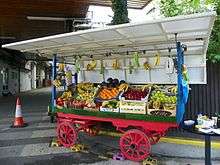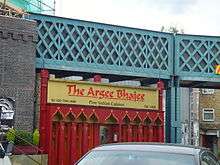Walford
| Walford | |
|---|---|
|
Bridge Street Café before its refurbishment in 2009 | |
| EastEnders location | |
| Created by | Tony Holland & Julia Smith |
| Genre | Soap opera |
| Type | London borough |
| Notable locations | Albert Square |
| Notable characters | EastEnders characters |
Walford is a fictional borough of east London in the BBC soap opera EastEnders. It is the primary setting for the soap.
EastEnders is filmed at Borehamwood in Hertfordshire, towards the north-west of London. Much of the location work is filmed in nearby Watford. It has been suggested that Watford was chosen for much of the exterior scenes due to its close proximity and the town's name being so similar to Walford. Thus, any stray road signs or advertising boards which are accidentally filmed in the back of shots will appear to read Walford. Locations used in Watford include most interior and exterior church scenes of various churches, the snooker club, the County Court and Magistrates' Courts courtrooms, and the cemetery (where most of the deceased characters are interred).
The name Walford is both a street in Dalston where one of the series' creators, Tony Holland, lived and a blend of Walthamstow, where Holland was born, and Stratford.[1] The suffix 'ford' is also found throughout East London, for example, South Woodford.[2] Walford's London postcode district is E20 (real East London postcode districts only went up to E18[3] until 2011, when E20 was introduced to serve the London 2012 Olympic Park[4]). Walford's fictional tube station, Walford East, is located on the EastEnders tube map in the position normally occupied by the real Bromley-by-Bow tube station.[5][6]
As part of 2010 Children In Need charity appeal, Walford became twinned with Weatherfield in a special programme uniting the two soaps EastEnders and Coronation Street called "East Street".
Locations within Walford

.jpg)

The main setting of EastEnders is Albert Square, where many of the characters reside. At the centre of the square is a garden, containing within it Arthur Fowler's bench, regularly known as 'The Bench of Tears', and one corner is taken up by The Queen Victoria Public House.[7] There is a B&B and a car lot.[7]
Bridge Street is the location of the street market and shops including the café, launderette and mini-supermarket. Turpin Road is the location of a war memorial, bookmaker, chip shop, funeral parlour, restaurant and an upmarket bar as well as several other businesses.[7] The nightclub on Turpin Road was originally named The Market Cellar until George Palmer buys it and renames it the Cobra Club. Over the years it becomes e20, Angie's Den, Scarlet and R&R, with owners including Steve Owen (1998–2002), Billy Mitchell (2002–03), Beppe di Marco (2002), Sharon Rickman (2002–05, 2013–14), Den Watts (2004–05), Johnny Allen (2005–06), Ruby Allen (2006), Roxy Mitchell (2007, 2010–11), Ronnie Mitchell (2007–09, 2010–12), Jack Branning (2007–11), Janine Butcher (2011–13) and Phil Mitchell (2011–present). The name R&R is taken from the initials of Ronnie and Roxy.[7] A major storyline within the club is in 1999 when Saskia Duncan is killed during a struggle with Steve and Matthew Rose. The name Turpin Road was chosen after the show's creators read that the East End was the haunt of notorious highwaymen, such as Dick Turpin.[2]
George Street is the location of a restaurant, Giuseppe's, later Argee Bhajee. Walford East tube station is on George Street,[7] which first appeared on screen in late 1985 when Lou Beale collapses outside it. On maps seen inside the station it replaces Bromley-by-Bow on the District line, but the building is in the style of those designed by Leslie Green, even though his work only appears on the Bakerloo, Northern, and Piccadilly lines.[8] The train sound was first heard in 1987 and the train's first appearance was in 1988 at Lou Beale's funeral. Trains did not appear again until 4 February 2010, when CGI was used in the show for the first time.[9] Platforms within the station were first seen in 2011 when Charlie Slater (Derek Martin) left Walford.
Turpin Way includes the local garage, informally known as The Arches, the community centre, a playground and a boxing gym.[7] Other locations seen or mentioned in the series include Victoria Square, Walford Towers, Kingsley Road,[10] Spring Lane, High Street, and Daisy Lane, which was named after the daughter of Series Designer Steven Keogh.[2] Walford Common was introduced to the series for the "Who Killed Lucy Beale?" storyline.
See also
- List of fictional railway stations
- List of fictional rapid transit stations
- List of London Underground-related fiction
References
- ↑ Smith 2005.
- 1 2 3 "How was the name Walford chosen?". BBC. Archived from the original on 5 April 2007.
- ↑ http://www.intolondon.com/postcodes
- ↑ http://www.legacycompany.co.uk/royal-mail-introduces-new-e20-postcode-for-the-olympic-park/
- ↑ "Underground EastEnders". Underground History. Retrieved 4 November 2009.
- ↑ Eastenders Website
- 1 2 3 4 5 6 "Welcome to Albert Square". Inside Soap. 12–18 July 2014.
- ↑ Leboff 2002, pp. 92.
- ↑ "Get your anoraks on... trains are coming!". BBC Online. 3 February 2010. Retrieved 4 February 2010.
- ↑ "Lucy Beale Case File – Evidence: Funeral". EastEnders. BBC Online. Retrieved 18 July 2014.
Bibliography
External links
| Wikimedia Commons has media related to EastEnders sets. |
- BBC map of Walford via Internet Archive
- Underground EastEnders Information on Walford East
